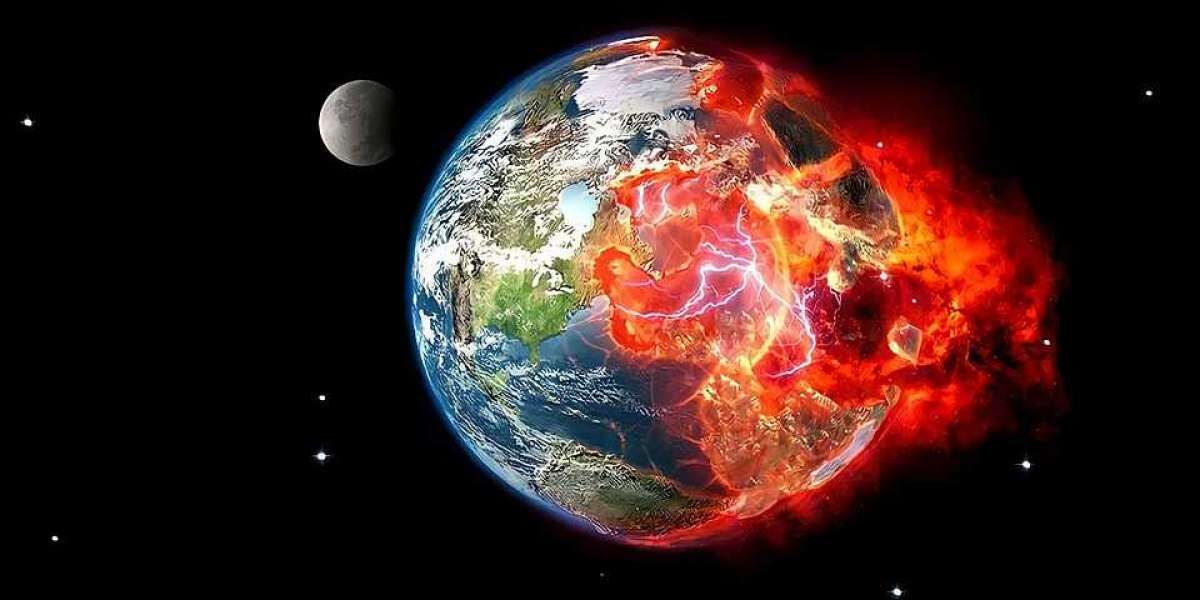Our earth has survived the billions of times of disastrous events that made it the world we live on now. But one day, there will be an event so disastrous that it'll destroy this floating gemstone and end the trial known as humanity. And from the lengthy number of possibilities, we ’ve narrowed our list to the top five Earth- shattering events.
Would we be smelled into an endless void? Could a alternate star appear and fry our earth? Or is death just staying below Earth’s crust?
You more get to the cellarage because then are the top five craziest events that could end the world. Whether it was the bifurcation of Pangea, or the meteor that took out the dinosaurs, Earth has been through further than one climactic event. These events changed our earth’s terrain while steering in new periods for the life- forms that followed. And that’s generally been at the expenditure of the brutes that were formerly then.
But nearly in our earth’s future lies an extermination event so ruinous that it might not simply take out all of humanity, but the Earth as well. And in a matter of time, our world could return to dust. So what would it take to rip apart the Earth fully?
Stargazing can bring a sense of wonder that calms your mind. But that may be over now. Because that firing star you spotted is n’t then to grant your want. You may want to duck
# 5. AN ASTEROID CAUSES A HYPERCANE
Hurricanes remain one of the most deadly natural events on our earth, and they leave a trail of death and destruction wherever they land. But if an asteroid hits an ocean with enough force and heat, hurricanes would be like fluff balls compared to what would come next. A big enough asteroid would heat the abysses to over 49 °C (120 °F).
And this could set off a massive storm known as a hypercane. Winds would move as presto as the speed of sound. And shadows would reach heights up to 40 km (25 mi). The winds would shoot water and aerosols into the stratosphere, destroying the ozone subcaste. So indeed if the winds did n’t carry you into space, you could get fried by the radiation on Earth’s face.
4. JUPITER BECOMES A STAR
This gas mammoth has twice the mass of all the globes in our Solar System combined. And the feasts swirling around inside Jupiter’s atmosphere are the same accoutrements that make up the Sun. But if Jupiter came times further massive, that distant yellow fleck would inflict annihilation on our earth.
With that important mass, Jupiter would turn into a star. Since this new star would be right in the middle of the Solar System, planetary bodies would change their routeways. Earth could get pulled by closer to Jupiter and get scorched by the heat coming off the former earth.
Or indeed worse, gravitational forces could make our world a mischief earth. That means we ’d be transferred down into space outside the Solar System, endlessly roving the Universe in hunt of a new home. Without the heat of the Sun to keep us warm, the face of Earth would indurate over, killing all life on our earth.
3. THE SUN Quaffs THE EARTH
Perhaps we should n’t concentrate on a star that has n’t formed yet and concentrate on the bone we have. After all, this ball of gas makes life possible on our earth. But since it burns through tons of hydrogen every alternate, it’s only a matter of time before this power source is used up.
And when that occurs, the Sun’s core will come impregnated with helium and begin to shrink. The increased pressure and temperature would beget the Sun to spear out massive quantities of energy. The Sun’s external layers would expand outward, creating a deadly heatwave on Earth. Our abysses would dematerialize into thin air, and the radiation would scorch the factory’s face. Eventually, the Sun, once the giver of life, would swallow up what’s leftism of our molten earth. And if the Sun keeps expanding, our Solar System would face a new trouble. Oh man, it just keeps getting worse.
2. EARTH GETS Smelled INTO A BLACK HOLE
Still, you could witness the birth of one of the most mysterious forces in the Universe, a black hole, If the Sun earnings indeed more mass before collapsing. The product of a dying star, the gravitational pull of this void can rip piecemeal other stars and globes.
Right now, the Sun is too small to produce one of these catastrophes. But if a black hole appears in front of Earth, the uneven gravitational pull would start screwing the earth. Earthquakes and stormy eruptions would break out each over the earth.
And as you come closer to the black hole’s event horizon, this monster might stretch out this world like a rubber band. A black hole sucks in matter by compressing it horizontally, making it look like a pate. We call this spaghettification. Every bit of our earth would be stretched into a string of tittles and fed into this empty void.
1. EVERY VOLCANO EXPLODES AT Formerly
Do you suppose Earth’s future could n’t get any worse? Come on. This is WHAT IF. And while the damage to our earth from a black hole would be terrible, the Earth does n’t need gravitational forces in space to produce an catastrophe. The real trouble lies beneath your bases.
Right now, 10 to 20 tinderboxes are erupting across our earth, spewing ash and gas into the atmosphere. But if every flash point on Earth exploded at formerly, you could n’t escape the smothers and heat, no matter where you live. Rocks reaching °C ( °F) would travel as presto as 700 km/ h (450 mph).
With such a massive quantum of molten gemstone slamming onto the face, the earth could lose its balance, and the poles could realign. A thick subcaste of ash and gas would suffocate Earth, and ultimately they ’d block all the sun. And while the lava cools, the temperature on Earth would drastically drop, transferring us into another Ice Age. While this event would n’t inescapably end our entire earth, it would destroy any chance of sustaining life until those shadows clear up.
Life on Earth has ended several times ahead, and it’s safe to say it'll be again. Suppose you ’re fixed for these scripts? Let us know in the commentary. Of course, we grounded these doomsday prognostications around wisdom and observable data. But some effects are beyond our understanding. Like, what if the real trouble to our actuality was n’t country miles underground? What if it was lower than 2 m (6 ft) below?








